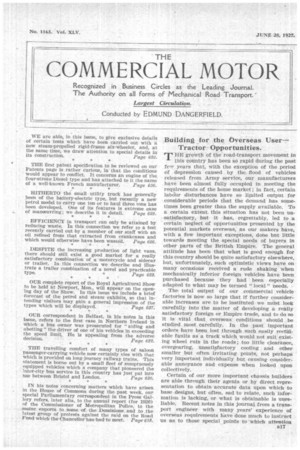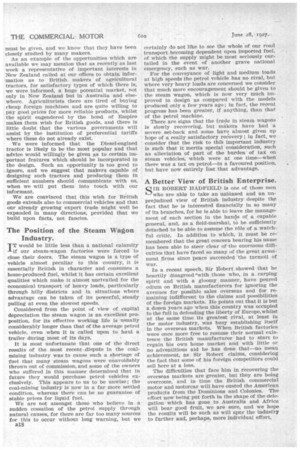Building -for the Overseas User • Tractor• Opportunities.
Page 35

Page 36

If you've noticed an error in this article please click here to report it so we can fix it.
'7, HE groWth of the-road-transport movement in "" this country has been so rapid during the past few years that, with the exception of the period of depression caused by the flood of vehicles released from Army service, our manufacturers have been almost fully occupied in meeting the requirements of the home market ; in fact, certain lalAr disturbances have so limited output for • considerable periods that the demand has sometimes been greater than the supply available. To a certain extent this situation has not been unsatisfactory, but it has, regrettably, led to a certain neglect of opportunities presented by the potential markets overseas, as our makers have, with a few important exceptions, done but little towards meeting the special needs of buyers in other parts of the British Empire. The general • attitude has been that what is good enough for this country should be quite satisfactory elsewhere, but, unfortunately, such optimistic views have on many occasions received a rude shakingWhen mechanically inferior foreign vehicles have been purchased because they had been especially adapted to what may be termed " local " needs.
The total output of our conamercial .vehicle factories is now so large that if further considerable increases are to he instituted we mist look 'carefully into the matter of developing a really satisfactory foreign or Empire trade, and to do so it is vital that overseas conditions should be studied most carefully. In the past important orders have been lost through such rectifiable faults as a track which would not suit existing wheel ruts in the roads ; too little clearance, overgearing, unsatisfactory cooling and other smaller but .often irritating points,. not perhaps very important individually but causing considerable annoyance and expense when looked upon collectively.
Certain of our more important chassis builders are able through their agents or by direct representation to obtain accurate data upon which to base designs, but often, sad to relate, such information is lacking, or. what is obtainable is unreliable. Recent notes in this journal from a transport engineer with many years' experience of 'overseas requirements have done much to instruct us as to those special points • to 'which attention must be given, and we know that they have been closely studied by many makers.
As an example of the opportunities which are available we may mention that as recently as last week a representative of important interests in New Zealand called at our offices to obtain information as to British makers of agricultural tractors, for satisfactory types of which there is, we were informed, a huge potential market, not only in New Zealand but in Australia and elsewhere. Agriculturists there are tired of buying cheap foreign machines and are quite willing to pay good prices for more reliable products, whilst the spirit engendered by the bond of Empire makes them wish for British goods, and there is little doubt that the . various governments will assist by the institution of preferential tariffs where these do not already exist.
We were informed that the Diesel-engined tractor Is likely to be the most popular and that advice would willingly be given as to certain important features which should be incorporated in the design. Such an opportunity is too good to ignore, and we suggest that makers capable of designing such tractors and producing them in sufficient numbers should communicate with us, when we will put them into touch with our informant.
We are convinced that this wish for British goods extends also to commercial vehicles and that our already growing export trade might well be expanded in many directions, provided that we build upon facts, not fancies.
The Position of the Steam Wagon Industry.
TT would be little less than a national calamity -I-if our steam-wagon factories were forced -to close their doors. The steam wagon is a type of vehicle almost peculiar to this country, it is essentially British in character and consumes a home-produced fuel, whilst it has certain excellent qualities which make it almost unrivalled for the economical transport of heavy loads, particularly through hilly districts and in situations where advantage can be taken of its powerful, steady pulling at even the slowest speeds.
Considered from the point of view of capital depreciation the steam wagon is an excellent proposition, for its effective working life is usually considerably longer than that of the average petrol vehicle, even when it is called upon to haul a trailer during most of its days.
It is most unfortunate that one of the direct results of the most recent dispute in the coalmining industry was to cause such a shortage of fuel that many steam wagons were unavoidably thrown out of commission, and some of the owners who suffered in this manner determined that in future they . would purchase petrol vehicles exclusively. This appears to us to be unwise ; the coal-mining industry is now in a far more settled condition, whereas there can be no guarantee of stable prices for liquid fuel.
We are not amongst those who believe in a sudden cessation of the petrol supply through natural causes, for there are far too many sources for this to occur without long warning, but we B18 certainly do not like to see the whole of our road transport becoming dependent upon imported fuel, of which the supply might be most seriously curtailed in the event of another grave national emergency, such as war.
For the conveyance of light and medium loads at high speeds the petrol vehicle has no rival, but where very heavy loads are concerned we consider that much more encouragement should be given to the steam wagon, which is now very much improved in design as compared with the models produced only a few years ago ; in fact, the recent progress has been greater, if anything, than that of the petrol. machine.
There are signs that the trade in steam wagons is slowly recovering, but makers have had a severe set-back and some have almost given up hope of a really satisfactory recovery; in fact, we consider that the risk to this important industry is such that it merits special consideration, such as alleviation of part of the burden of tai on steam vehicles, which were at one time—when there was a tax on petrol—in a favoured position. but have now entirely lost that advantage.
A Better View of British Enterprise.
8IR ROBERT HADFIELD is one of those men who are able to take an unbiased and an unprejudiced view of British industry despite the fad that he is interested financially in so many of its branches, for he is able to leave the management of each section in the hat, of a capable general, and, as a field-marshal, to be sufficiently detached to be able to assume the role of a watchful critic. In addition to which, it must be remembered that the great concern bearing his name has been able to steer clear of the enormous difficulties that have faced so many of the great armament firms since peace succeeded the turmoil of war.
In a recent speech, Sir Robert showed that he heartily disagreed "with those who, in a carping spirit and with a gloomy, manner, have poured odium on British manufacturers for ignoring the avenues for possible sales overseas and for remaining indifferent to the claims and possibilities of the foreign markets. Ile points out that it is but a dozen years ago when this country was occupied to the full in defending the liberty of Europe, whilst at the same time its greatest rival, at least in the motor industry, was busy establishing itself in the overseas markets. When British factories were once more free to resume their normal existence the British manufacturer had to start to regain his own home market and with little or no adventitious aid he has done that—no mean achievement, as Sir Robert claims, considering the fact that some of his foreign competitors could sell here at a loss.
The difficulties that face him in recovering the overseas markets are greater, but they are being overcome, and in time the British commercial motor and motorcar will have ousted the American products from the Dominions and Colonies. The effort now being put forth in the shape of the delegation which has gone to Australia and Africa will bear good fruit, we are sure, and we hope the results will be such as will spur the industry to further and, perhaps, more individual effort.




































































































